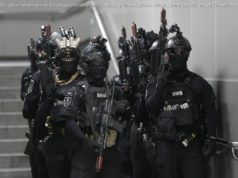North Korea’s supreme leader got up before dawn this Sunday morning to witness the test flight of the…
North Korea’s supreme leader got up before dawn this Sunday morning to witness the test flight of the new Hwasong-12 missile. It was worth his time. The missile arced well over 1,000 miles up into space before splashing down, as planned, into the Sea of Japan. There were big grins, applause, and hand clasps at Kim Jong Un’s observation post — a regular Mother’s Day celebration, if you count « mother » as half a word.
According to the state-controlled media, the leader then took the occasion to lecture the United States, saying that his country « is a nuclear power » whether anyone else « recognizes » it or not, and is prepared to respond to American military « provocations. » In that event, Kim said, « the U. S. had better see clearly » whether or not North Korean missiles are capable of retaliatory strikes. None of these remarks were exactly new, but the Hwasong-12 test does put a sharper point on them.
Now what?
Two things ought to be clear by now. First, North Korea’s military technology is more advanced than it usually gets credit for. South Korea’s Defense Minister told parliament on Tuesday that the enemy’s missile program was « progressing faster than expected. » Where has this guy been for the last few years? The only surprise is that anybody is still surprised.
Experts find possible North Korea links in global cyber attack
Second, more than anything else, North Korea wants the U. S. military out of their face. They don’t like the standing presence of American forces in South Korea. They don’t like the twice-annual combined exercises with the South Korean military. They don’t like periodic visits to the region by U. S. heavy bombers, cruise-missile submarines, carrier strike groups, and the like.
The North Koreans frequently remind us that they saw what happened to Iraq and Libya, and they have no intention of replaying that movie in their home theater.
That, of course, is where the nukes come in. The North Koreans have repeatedly warned that if the United States starts a war against them, they will use nuclear-armed missiles against the ports and airbases in South Korea and Japan that U. S. armed forces will need to conduct the fight. They will attack other U. S. bases in the Pacific, such as the ones on the island of Guam, which falls within the range of the Hwasong-12. And, they promise, they will also be able to threaten the United States itself.
If that sounds bad, it is! But this strategy is aimed, first, at deterring an American bombing campaign or invasion of North Korea, and, second, at weakening the U. S.-South Korean alliance. None of it points toward some sort of Pearl Harbor-style sneak attack with nuclear missiles.
Putin warns against retaliation for North Korea missile launch
So there’s no reason to be surprised when the North Koreans get around to flight-testing a mobile intercontinental ballistic missile that could reach Washington, D. C. — and there’s no reason to panic. The United States has survived and thrived for decades with thousands of Soviet nuclear weapons pointed this way, and hundreds of Russian weapons today. We’ve had no problem with a few dozen Chinese nuclear weapons, either.
A few dozen North Korean nuclear weapons won’t be all that different — they won’t pose an imminent threat, because the United States is more than capable of an overwhelming response, and the other side knows it.
But there are some special reasons for concern. Crises between North and South Korea can crop up unpredictably, and South Korea’s increasingly capable military has the ability to start a shooting war without American consent or approval.
If the South Koreans were to respond to a small-scale North Korean attack by retaliating against Pyongyang, would the North Koreans take it sitting down? If the North Koreans counterattacked, the United States would face an impossible decision between its commitment to aid the South and the danger of nuclear war.
North Korea missile test due to Kim’s ‘paranoia’ : Nikki Haley
It’s far too late to change this situation by force. After five underground nuclear tests, North Korea already appears to have the ability to carry out its threats in South Korea and Japan. Even without nukes, a second Korean War stands to be staggeringly destructive — and this time, it would devastate a major hub of the global economy.
That’s why Washington keeps falling back on international condemnation and sanctions as its main tools against North Korea’s nuclear threat. But North Korea has advanced its strategic programs even as sanctions have intensified. Its economy has even grown modestly thanks to internal reforms. Sanctions can and will be tightened, but it’s already pretty clear that they’re not a solution.
At some point, we are bound to conclude that we need a way to live with a mutual nuclear deterrence relationship with North Korea — just like with Russia and China. That means establishing communications links for crisis management. In that process, the North Koreans will demand changes to our military practices in the region, including the regular exercises with the South. Some hard choices will be involved.
It’s an unattractive idea, but at least the timing is up to us. We can go to the bargaining table now to see if we can get a deal that stops further developments in North Korea’s missile and nuclear programs. Or we can keep putting these choices off. But eventually, North Korea will test more advanced nuclear weapons. It will successfully fly one or more type of ICBM. After that happens, the only one smiling will be Kim Jong Un.
Pollack is editor of the The Nonproliferation Review and a senior research associate at the James Martin Center for Nonproliferation Studies.






